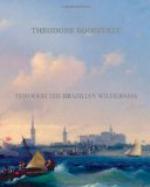X. To the
Amazon and home; zoological
and geographical results
of the expedition
Our adventures and our troubles were alike over. We now experienced the incalculable contrast between descending a known and travelled river, and one that is utterly unknown. After four days we hired a rubberman to go with us as guide. We knew exactly what channels were passable when we came to the rapids, when the canoes had to unload, and where the carry-trails were. It was all child’s play compared to what we had gone through. We made long days’ journeys, for at night we stopped at some palm-thatched house, inhabited or abandoned, and therefore the men were spared the labor of making camp; and we bought ample food for them, so there was no further need of fishing and chopping down palms for the palmtops. The heat of the sun was blazing; but it looked as if we had come back into the rainy season, for there were many heavy rains, usually in the afternoon, but sometimes in the morning or at night. The mosquitoes were sometimes rather troublesome at night. In the daytime the piums swarmed, and often bothered us even when we were in midstream.
For four days there were no rapids we could not run without unloading. Then, on the 19th, we got a canoe from Senhor Barboso. He was a most kind and hospitable man, who also gave us a duck and a chicken and some mandioc and six pounds of rice, and would take no payment; he lived in a roomy house with his dusky, cigar-smoking wife and his many children. The new canoe was light and roomy, and we were able to rig up a low shelter under which I could lie; I was still sick. At noon we passed the mouth of a big river, the Rio Branco, coming in from the left; this was about in latitude 9 degrees 38 minutes. Soon afterward we came to the first serious rapids, the Panela. We carried the boats past, ran down the empty canoes, and camped at the foot in a roomy house. The doctor bought a handsome trumpeter bird, very friendly and confiding, which was thenceforth my canoe companion.
We had already passed many inhabited—and a still larger number of uninhabited—houses. The dwellers were rubbermen, but generally they were permanent settlers also, homemakers, with their wives and children. Some, both of the men and women, were apparently of pure negro blood, or of pure Indian or south European blood; but in the great majority all three strains were mixed in varying degrees. They were most friendly, courteous, and hospitable. Often they refused payment for what they could afford, out of their little, to give us. When they did charge, the prices were very high, as was but just, for they live back of the beyond, and everything costs them fabulously, save what they raise themselves. The cool, bare houses of poles and palm thatch contained little except hammocks and a few simple cooking utensils; and often a clock or sewing machine, or Winchester




